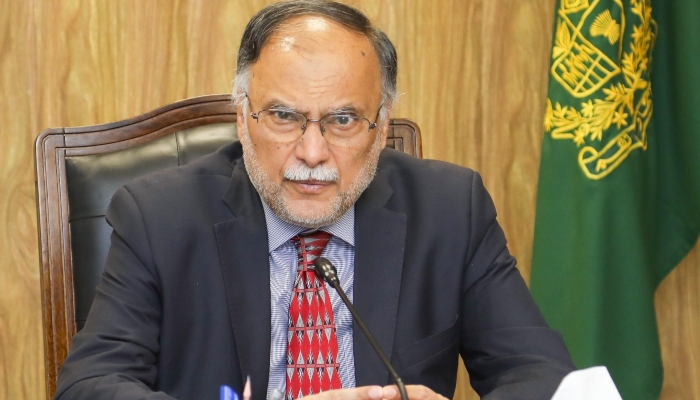Minister announces establishment of Creative Industries, Blue Economy units
Ahsan Iqbal says initiative aims to foster economic growth through promotion of creative talents
ISLAMABAD: Unveiling a transformative step towards economic diversification and sustainable growth, the Ministry of Planning and Development Saturday announced establishment of dedicated units for the Blue Economy and Creative Industries within the ministry.
In a media statement, Federal Minister for Planning and Development Ahsan Iqbal stated the new units were part of the broader 5Es National Economic Transformation Plan, a comprehensive strategy aimed at driving Pakistan towards a resilient and prosperous future.
The Creative Industries unit would focus on harnessing the potential of the country’s rich cultural heritage, innovative design sectors and vibrant arts, said a press release.
Iqbal said the initiative aimed to foster economic growth through the promotion of creative talents and the development of creative hubs that would support entrepreneurship, job creation and cultural exchange.
The minister said that the creative economy was a vital component of our national development strategy.
He said by investing in the creative industries, the government was not only preserving the cultural heritage but also creating new economic opportunities that would contribute significantly to country’s GDP and employment rates.
“Globally, the Creative Industries are one of the fastest-growing sectors of the world economy,” he said.
According to the United Nations Educational, Scientific and Cultural Organisation (Unesco), the creative economy generates $2.25 trillion annually and provides nearly 30 million jobs worldwide.
With more than 60% of Pakistan’s population under the age of 30, the country boasts a vast reservoir of youthful energy and creativity.
This young demographic presents a unique opportunity to drive innovation and entrepreneurship in the creative sectors, the press release said.
By providing the necessary infrastructure, training and support, the Creative Industries unit aims to unlock the potential of Pakistan’s youth, enabling them to contribute to the national economy and compete on a global stage, it added.
Meanwhile, the Blue Economy unit will concentrate on the sustainable utilisation of Pakistan’s vast maritime resources.
“This unit will work on developing policies and projects that enhance the sustainable use of ocean resources for economic growth, improved livelihoods, and the preservation of marine ecosystems.
“Key areas of focus will include fisheries, maritime tourism, marine biotechnology, and renewable ocean energy,” the media release said.
Iqbal said the Blue Economy held immense potential for Pakistan, given its extensive coastline and marine resources. He said through sustainable practices and innovative policies, the government aimed to unlock the economic potential of the country’s oceans while ensuring environmental protection and social inclusion.
“The Blue Economy is a rapidly expanding sector globally, with the World Bank estimating that it could generate $3 trillion annually by 2030. Pakistan’s coastline stretches over 1,046 kilometers, offering significant opportunities for the development of maritime industries.
The China-Pakistan Economic Corridor (CPEC) provides a substantial boost to Pakistan’s Blue Economy.
By enhancing port infrastructure, developing coastal tourism, and fostering maritime trade, CPEC creates new opportunities for economic development.
The strategic Gwadar Port, in particular, is set to become a hub of maritime activity, facilitating trade routes and attracting investment in maritime industries.
The Ministry of Planning and Development will soon launch detailed action plans for both units, outlining specific projects, timelines and expected outcomes.
Stakeholders from across Pakistan are encouraged to engage with these initiatives to maximise their impact and contribute to the nation’s economic transformation.
-
Security forces gun down 30 terrorists in multiple IBOs in KP: ISPR
-
MQM-P calls for new province in Sindh
-
US report validates Pakistan military edge over India: PM
-
Banned TTP poses serious threat to Pakistan security: UNSC panel
-
CM Afridi clarifies remarks on by-poll after ECP requests army deployment
-
Dubai sees 3.2m Pakistani passengers in 2025 as airport sets new milestone
-
Security forces kill 23 Indian proxy terrorists in KP's Kurram
-
Pakistan to construct island to boost oil exploration: report












